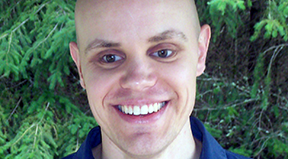
My name is Randy, and I’m a systems analyst. This means that I translate customer and company requirements for our products into specific language for software developers. Additionally, I support applications, provide pre-and-post-sales support to our sales and marketing teams, and roadmap future product development. In short, I’m the bridge between those who work on the technical side and those who don’t; I work to make technology understandable for non-technologists, and provide guidance for the technologists.
The product that I work on most of the time directly impacts the world. It helps to prevent fraud and identity theft, which is a fast-growing crime. I take a lot of pride in my involvement in the product, and feel that I am directly advocating for the consumers and companies impacted by fraudulent transactions and activities.
How did you end up in your current position?
I studied computer science and networking for my undergraduate degree at the Evergreen State College in Olympia, WA. After working for about ten years, I studied technology management for my master’s degree at City University of Seattle. I started my technology career supporting end users, mostly in desktop and application support. Over time, I moved on to managing teams and projects.
Does your disability affect your career?
I am completely blind, so I use screen reading software to access computers. Early in my career, screen readers didn’t work with all computer applications. As screen readers have improved and mainstream computer hardware and software have become more accessible, I have gained more and more access to applications, including those pertinent to my job. As of now, the only real job functions that I cannot perform relate to creating or analyzing diagrams.
What can I do while I’m in high school if I want to pursue a career in computing?
If you’re interested in computing, there are some things that you can do to help ensure that you’re successful:
- Go to college. As a hiring manager, I only look at resumes of people that have college degrees, preferably in sciences, mathematics, or engineering, though other degrees may be acceptable if you have work experience in the field.
- Seek out experience in the field. Find internships, work-study, or other jobs that will give you real-world work experience. It will make your resume look better, and give you an understanding of the employee-employer relationship.
- Seek out mentors. Talk to people in whatever industry you choose to pursue. Find out what they do on a daily basis, how they do it, and what the job market is like both at the entry level and for people with three-to-five years of experience.
What does it take to be a computing professional?
A thirst for learning will help you as you study computing. I always look for ways to learn more, which is essential in a rapidly developing field. Learn to see the big picture and the smaller details. Viewing the entire environment, system, or process at once means that you can anticipate what will be necessary or see potential gaps or pitfalls. Paying attention to the details means that you can interact with other technologists. Technologists are engineers at heart, and need detail to feel comfortable.
Why should I study computing?
In my experience, computing provides an open door to information. I always look to learn, experience, and grow. Computers and technology provide me more access to information than I could have dreamed.
Technology is a broad field that encompasses several subgenres. Choosing a career in technology does not mean that you will be creating code for the rest of your life. If you are a people person, consider technology support. If you like tangible results, go into hardware development. If you like solving extremely complex math or logic problems, consider software development. Think about technology security, networking, communications, marketing, project management, or database administration.
Finally, I would note that the technology field is one in which women are woefully underrepresented. I would strongly encourage any women interested in math or science to consider technology for its wealth of opportunities, generally accepting atmosphere, and still-developing nature.